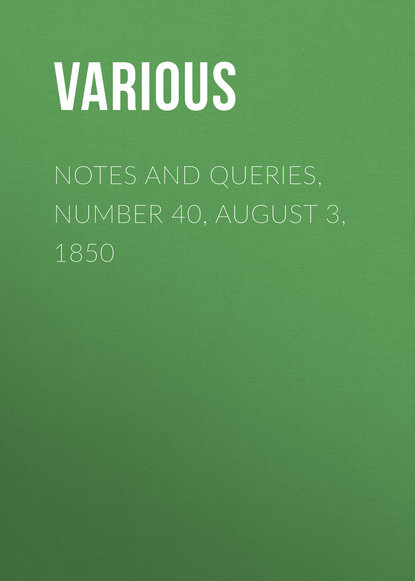По всем вопросам обращайтесь на: info@litportal.ru
(©) 2003-2024.
✖
Notes and Queries, Number 40, August 3, 1850
Автор
Год написания книги
2018
Настройки чтения
Размер шрифта
Высота строк
Поля
Quarles' Argalus and Parthenia, p. 118. ed. 1647.
On l. 812. (G.):—
"Bathed in worldly bliss."
Drayton, p. 586. ed. 1753.
"The fortunate who bathe in floods of joys."
E. of Sterline's Works, p. 251. ed. 1637.
On l. 834. (D.):—
"The lily-wristed morn."
The Country Life, Herrick's Hesperides, p. 269.
(G.):—
"Reacht him her ivory hand."
Ph. Fletcher's Purple Island, p. 117.
On l. 853. (G.) Compare this line of Drayton in his Baron's Warrs:—
"Of gloomy magicks and benumbing charms."
Vol. i. p. 110. ed. 1753.
On l. 861. (G.):—
"Through whose translucent sides much light is born."
Ph. Fletcher's Pur. Island, C. 5. St. 31. p. 54.
On l. 862. (M.):—
"All hundred nymphs, that in his rivers dwell,
About him flock, with water-lilies crowned."
Ph. Fletcher's Poet. Miscell., p 67. ed. 1633.
On l. 863. (G.) The use of Ambergris, mentioned in Warton's note, appears from Drayton, v. ii. p. 483.:—
"Eat capons cooked at fifteen crowns apiece,
With their fat bellies stuft with ambergrise."
On l. 886. (G.):—
"The wealth of Tarsus nor the rocks of pearl,
That pave the court of Neptune, can weigh down
That virtue."
Beaumont and Fletcher's Philaster, Act iv.
On l. 894. (G.):—
"Beset at th' end with emeralds and turches."
Lingua iv. 4. Old Plays, v. 5. p. 202. ed. 1780.
On l. 924. (M.) Mr. Warton says this votive address was suggested by that of Amoret in the Faithful Shepherdess; but observes that "the form and subject, rather than the imagery, is copied." In the following maledictory address from Ph. Fletcher's 2nd eclogue, st. 23., the imagery is precisely similar to Milton's, the good and evil being made to consist in the fulness or decrease of the water, the clearness or muddiness of the stream, and the nature of the plants flowing on its banks:—
"But thou, proud Chame, which thus hast wrought me spite,
Some greater river drown thy hatefull name;
Let never myrtle on thy banks delight;
But willows pale, the leads of spite and blame,
Crown thy ungratefull shores with scorn and shame:
Let dirt and mud thy lazie waters seize,
Thy weeds still grow, thy waters still decrease;
Nor let thy wretched love to Gripus ever cease."
P. 13. ed. 1633.
See also the "Masque," in Beaumont and Fletcher's Maid's Tragedy, Act I. vol. i. p. 17. edit. 1750.
On l. 936. (G.):—
"And here and there were pleasant arbors pight,
And shadie seats and sundry flowring banks."
Spenser's F. Queen, vol. ii. p. 146. ed. 1596.
On l. 958. (G.):—
"How now! back friends! shepherd, go off a little."
As You Like It, iii. 2.
On l. 989. (D.) See Bethsabe's address to Zephyr in tire opening of Peele's David and Bethsabe:—
"And on thy wings bring delicate perfumes."
On l. 995. (D.):—
"Her gown should be goodliness
Well ribbon'd with renown,
Purfil'd with pleasure in ilk place











